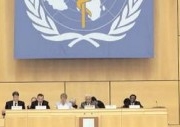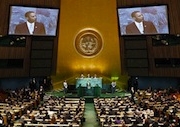Faith, health & the World Health Organisation
 The World Health Assembly in Geneva comes to an end today, after a relatively uneventful few days. The WHA is the strategy setting body for the World Health Organisation, and so its decisions affect the global health priorities of the world for the coming years. At this year’s Assembly there was a major new push to eliminate polio in its few remaining endemic areas (Nigeria, Pakistan and Afghanistan), more initiatives on non-communicable diseases, etc, etc. Margaret Chang was reappointed General Secretary, and various funding and strategic priorities were agreed.
The World Health Assembly in Geneva comes to an end today, after a relatively uneventful few days. The WHA is the strategy setting body for the World Health Organisation, and so its decisions affect the global health priorities of the world for the coming years. At this year’s Assembly there was a major new push to eliminate polio in its few remaining endemic areas (Nigeria, Pakistan and Afghanistan), more initiatives on non-communicable diseases, etc, etc. Margaret Chang was reappointed General Secretary, and various funding and strategic priorities were agreed.
Not really headline grabbing stuff, but then most of the hard work in tackling global health problems never does grab headlines – it is down to ordinary people on the ground doing ordinary work that makes a real difference. Which does lead some, quite reasonably to ask, what is the point of the World Health Organisation? Does it really change anything, or is it just a talking shop and a rubber stamp?
At a recent Nuffield Council for Bioethics lecture, Dr Amar Jesani, Editor of the Indian Journal of Medical Ethics, said that the WHO has largely given up leadership on global health strategy to the commercial sector and philanthropic foundations, such as the Gates Foundation. These bodies are less focussed on public health and bottom up community health systems, but on big name, high priority initiatives, public/private partnerships, hi-tech solutions and new markets for health products. The WHO merely acts as the brains to make all of this workable in policy terms, but it is no longer the driver, Jesani argues.
Alma Ata was the great moment when the world was to give itself to primary care as the major health strategy – building from the bottom up rather than focusing on top down health strategies. It never happened, because, in the end, commercial interests and high profile philanthropy had no real use for it. To misquote Chesterton – it was not tried and found too difficult, but found unprofitable and therefore not tried at all! And although as recently as 2008 the WHO has said it needs to return to this bottom up, community led approach to health, doubt remains that much has really changed.
Furthermore, the aid sector, both state and philanthropic, are driven by a wide range of agendas that are not necessarily motivated by the best interests at the poor. Consider the recent US withdrawal of aid from Pakistan because of the jailing of Dr Shakil Afridi who got access to Osama bin Laden’s DNA for the CIA in a ‘fake’ polio vaccine programme – worryingly tying aid and health programmes to US national security. This is only one, extreme example of the ways that state and aid sector priorities in health need not be those of the people.
In his recent book, Dean Pallant of the Salvation Army looks at the place of faith based groups in this model of health driven by a very Western model of Capitalism and national self-interest, and asks the question – how does faith fit into the international health equation? The temptation is for Church hospitals and faith based health organisations to go where the money is – towards commercial, international donor or state sponsored health priorities, and as Faith Based Organisations (FBOs) are currently being fêted by some parts of the international development community as the ‘next big thing’ it is easy to see the temptation and pressure to get sucked into all of this.
Pallant instead is arguing that rather than fall in with all of this, we need to take another view – one that puts our faith at the centre of all we do in health, and seeks to work with the poor to find health solutions that spring from our deepest theological and spiritual convictions and vision. This means not just going along with the easily latched onto, big name initiatives and über-goals (like the Millennium Development Goals). It also means not being complicit in a purely biomedical model of health and illness, and instead understanding and rediscovering a theology of health that focusses on becoming ‘healthy people’ – not just free of illness, but freed to become the people God created us to be in all dimensions.
This does not mean ignoring the global community, global goals and strategies and so forth. But it does mean not being hidebound by their external agendas. It means partnerships with governments, secular funders and agencies should not be eschewed, but neither should Christian FBOs be exclusively bound to the priorities of these actors. That does require some genuine dialogue and understanding by both sides, but it can be done.
Christian faith based health programmes have to be local, flexible and responsive, innovative, and above all driven by our faith in the risen Jesus who makes men and women whole, no just physically in the health ministries of Christian organisations, but in the social and spiritual realms through the transforming work of the gospel and the role of the church in the local community. That is bound to sit uncomfortably with many who argue God has no place in development, but as more research is showing, the poor of Africa, Asia and Latin America disagree – they like faith based health, education and development – not because we do it better than the secular alternatives (it is quite clear that we do not), but because faith is at the centre of what we do, just as faith is at the centre of their lives.
So, maybe it is time for us as Christian health initiatives to stop wondering quite so much about what the WHO is up to, and start engaging more with how our faith informs our actions and priorities.












Leave a Reply
Want to join the discussion?Feel free to contribute!